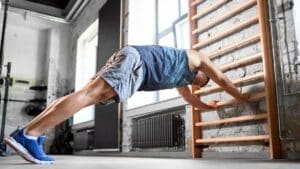
We know that getting the right amount of sleep is essential for athletes to properly recover and perform at their best, but many of us struggle with knowing exactly how much sleep we should be getting. We often hear that you need 8 hours to feel refreshed, but what if you’re trying to maximize your muscle recovery? Here we’ll examine why it’s important to get enough rest for your muscles and discuss the ideal amount of sleep for optimal recovery. By understanding the key elements of a successful sleep strategy and arming yourself with tips on how you can better prioritize it in your life, both athletes and fitness enthusiasts alike will find ways they can supercharge their workouts through proper rest.
How Does Sleep Affect Muscle Recovery?
Sleep isn’t just a time for your mind to recharge; it’s also when your body goes into repair mode. During sleep, our body releases growth hormones in larger amounts which aid in the protein synthesis process necessary for building and repairing muscles. An increase in blood flow to your muscles provides nourishing oxygen and nutrients that can help speed up the recovery process, repair any damage done to muscles, and even regenerate cells.
Additionally, a good night’s rest reduces inflammation and aids in the removal of metabolic waste, allowing your muscles to bounce back after a strenuous workout. Studies also show that a lack of sleep can decrease anabolic hormones like testosterone, which play a vital role in building muscle and losing fat.
How Much Sleep Do You Need for Muscle Recovery?
While there’s no one-size-fits-all answer, most experts agree that the sweet spot for muscle repair and growth lies between 7 and 9 hours of sleep per night. Those who lead more active lifestyles may need a bit more and could use up to 10 hours of sleep. It’s not just about the number of hours you sleep, but also the quality of your slumber. Aim for uninterrupted, deep sleep to allow your body to fully reap the benefits of recovery.
REM Sleep and Recovery
Rapid Eye Movement (REM) sleep is particularly vital for muscle recovery. It’s during this stage that your body undergoes the most significant healing and growth.
REM sleep typically kicks in following three stages of non-REM sleep, commonly referred to as slow-wave or deep sleep. This cycle is repeated every 90 to 120 minutes with most of your REM sleep occurring in the later part of nighttime.
During REM sleep, your body’s resources are devoted to the repair and restoration of tissues like muscles while simultaneously providing a surge to the central nervous system that increases energy levels and overall functioning.
Other Benefits of REM Sleep:
• Improved Concentration and Memory
• Reduced Stress and Anxiety
• Enhanced Cognitive Performance
• Regulation of Mood
• Reduced Inflammation
• Increased Immune System Functioning
What Are Signs I’m Not Getting Enough Quality REM Sleep?
Signs of inadequate or disrupted sleep can vary from person to person, but look out for changes in mood, difficulty concentrating, irritability, and problems with memory. Additionally, the inability to wake up routinely at the same time or waking up feeling unrested may indicate that a person is not getting adequate sleep on a regular basis. If these symptoms appear regularly, it’s important to have an honest dialogue with your doctor about ways to ensure your overall health.
How Accurate Are Sleep Trackers?
Every sleep tracker is distinctive and has a varied level of accuracy depending on its design and technology.
Generally, though, sleep trackers are pretty accurate at tracking total sleep time, but aren’t completely reliable when it comes to sleep stages and quality. While a sleep tracker can make an educated guess about your sleep stages, the only reliable way to assess which stage of rest you are in is through making measurements of brain activity during a polysomnography or electroencephalogram (EEG) test administered by a professional.
Though the accuracy of their sleep quality results remains disputed within scientific circles, more advanced technology is always being developed, including home speed tests and home sleep EEG.
Tips for Getting Sleep for Muscle Recovery
- Create a Bedtime Routine – Set up an evening routine that signals to your body it’s time to wind down and get ready for sleep.
- Exercise in the Morning or Afternoon – Working out too late can interfere with your body’s natural sleep-wake cycle.
- Limit Caffeine Earlier in the Day – Avoid caffeine after lunch if possible for optimal recovery and sleep quality.
- Avoid Alcohol Before Bed – Drinking alcohol can disrupt your normal REM and slow-wave sleep cycles.
- Get Outdoors During the Day – Natural sunlight is important for nutrient production and resetting your body’s natural circadian rhythm.
- Reduce Stress Levels Before Bedtime – Try meditating, journaling, or deep breathing to reduce stress levels before bed.
- Invest in a Comfortable Mattress – A comfortable mattress is essential for promoting quality sleep and muscle recovery.
- Keep Your Room Dark – Darkness during the night helps your body produce melatonin and other hormones necessary for restful sleep.
- Download a Relaxing App – There are hundreds of apps that can help you relax and fall asleep, such as white noise or guided meditation.
- Take Magnesium Supplements – Magnesium is known to promote relaxation and muscle recovery. Talk to your doctor before taking any supplements.
FAQ About Sleep and Muscle Recovery
Yes, napping can contribute to muscle recovery. Short naps (20-30 minutes) can help refresh your mind and body, while longer naps (90-120 minutes) may allow you to enter REM sleep and further support muscle recovery. However, avoid napping too close to bedtime, as it may disrupt your night-time sleep.
What is the impact of nutrition on sleep and recovery?
Proper nutrition plays a significant role in sleep quality and muscle recovery. Consuming a balanced diet, rich in proteins, complex carbohydrates, healthy fats, vitamins, and minerals supports the body’s repair processes during sleep. Additionally, some foods, such as tart cherries, milk, and nuts, contain sleep-promoting compounds that may enhance sleep quality.
Are there any specific sleep positions that can help?
While there is no one-size-fits-all sleep position for muscle recovery, sleeping on your back with a pillow to support the natural curve of your spine can help maintain proper alignment and minimize muscle strain. Side sleepers can use a pillow between their knees to reduce pressure on their hips and lower back. Ultimately, the best sleep position is the one that allows you to sleep comfortably and wake up without pain or stiffness.
Is it possible to catch up on sleep during the weekends for better recovery?
While catching up on sleep during the weekends can provide short-term relief from sleep deprivation, it’s not a long-term solution for optimal muscle regeneration. A consistent sleep schedule that includes sufficient sleep each night is the best approach for ensuring your body can effectively repair and rebuild muscles.
Should I eat protein before bed to help with muscle recovery?
Studies prove that consuming protein before bed is one way to help with muscle recovery, as it provides the body with essential amino acids to take full advantage of the spike in growth hormone. Also, while we’re dozing off, our bodies enter a fasting-like state, and muscle is actually broken down in order to provide amino acids for the stomach. Eating before bed can help prevent that.



